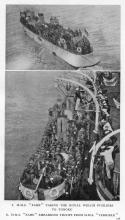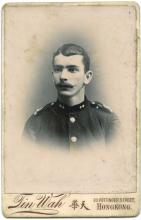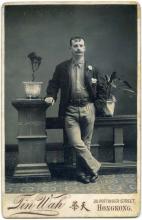The regiment's Second Battalion was in Hong Kong from 13 Jan 1899 until Nov 1902
p.8, The Hong Kong Weekly Press, 1899-01-21:
ARRIVAL OF THE ROYAL WELSH FUSILIERS.
The second Battalion of the Royal Welsh Fusiliers, who take the place of the King's Own, arrived on the 13th January in the chartered transport Avoca. The vessel went alongside the wharf at Kowloon and at about half past eight the landing of the baggage began. The disembarkation of the troops took place in the afternoon, the men proceeding to the barracks vacated by the King's Own.
p.4, The China Mail, 1902-11-11 - the serving men depart on 11 Nov:
The Royal Welch Fusiliers.
The 2nd Battalion of the Royal Welch Fusiliers embarked on board the chartered transport Wakool yesterday. That is to say the portion of the battalion bound for India embarked, the time-expired men remaining here in order to go on board the which will convoy them to England. Shortly after 7 a.m., the headquarters of the battalion, headed by Lieut.-Colonel the Hon. R. H. Bertie, with junior officers carrying the colours and the band playing a catchy quickstep, left Mount Austin Barracks, some 200 or more strong, and marched down tho Peak Road to the lower level. Prior to that hour, baggage trains of coolies, under fatigue parties, had wended a serpentine course down the sinuous roadway.
There was little or no pomp or circumstance about the departure of the Fusiliers, who have had a varied experience in China. Almost from the day it landed here, the battalion has been split up, latterly, a half-battalion doing duty in Tientsin and Peking, a circumstance not at all conducive to the good of a corps, being unsatisfactory alike to officers and men. This is one reason why the battalion has b???ed less in the social life of the Colony than some of its predecessors ; but Colonel Bertie and some of his officers have been exceedingly popular all round, and a large party of friends went on board to say good-bye to the Hon. Mrs Bertie, Mrs Beresford-Ash, Mrs Lloyd and the other ladies of the regiment.
Contrary to expectations, the Wakool did not sail on Monday, the reason being, we believe, that a typhoon had been signalled from Manila. She sailed about noon to-day.
Mentioning the departure of the Fusiliers, it is only right to refer to the pleasure afforded by the band under the skilful leadership of Bandmaster Moir. It is one of the best that has visited Hongkong in recent years, and during his stay here Mr Moir has given several instances of his ability by organising military tatoos at which the massed bands of the various regiments have performed.
p.4, The China Mail, 1902-11-17 - the remaining 'time-expired' men, i.e. men who had completed their service, departed on 16 Nov:
Departure of Welch Fusiliers.
The time-expired men of the Royal Welch Fusiliers, who were left behind by headquarters, embarked on board the chartered P. and O. transport Palawan on Saturday, and left for England yesterday afternoon. There were upwards of 400 men, who were under the command of Major Gwynne.


